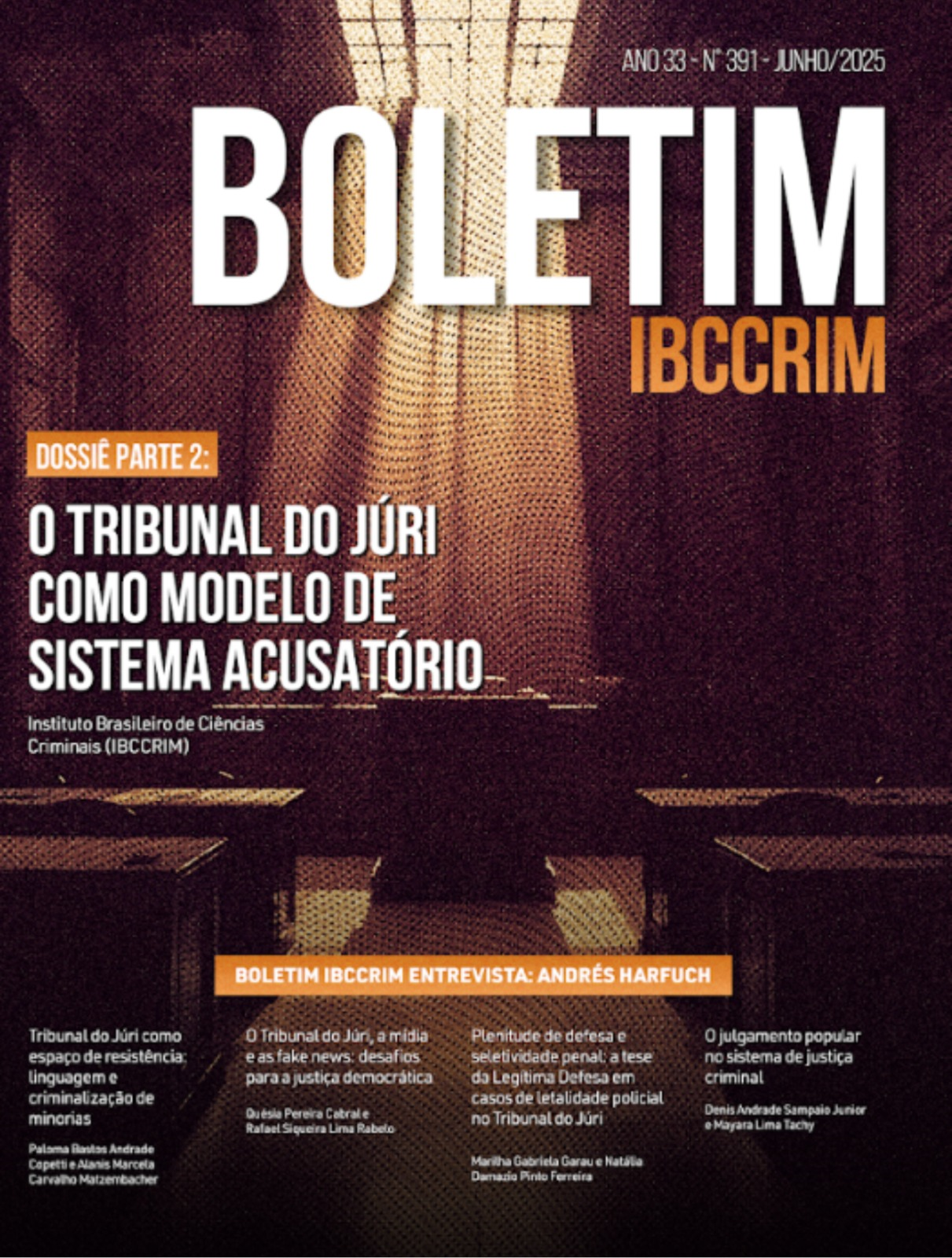Jury Trials, media, and fake news:
challenges to democratic justice
DOI:
https://doi.org/10.5281/zenodo.15467447Keywords:
Disinformation, Information society, Judicial impartiality, Popular trial, Algorithms, Public opinionAbstract
This article analyzes the challenges posed by the spread of disinformation in the context of jury trials, focusing on the research question: “How do fake news impact the impartiality of trials for intentional crimes against life, and what strategies can mitigate this problem?” The structure of the text includes a theoretical discussion on the information society and the post-truth era, highlighting the role of digital platforms in amplifying disinformation. Landmark cases exemplify how media influence and social networks shape jurors and public opinion, compromising the neutrality of verdicts. The article emphasizes the need for regulatory measures, media literacy, and stricter control over the spread of fake news in digital environments to uphold democratic principles and ensure fair trials.
Downloads
Publication Facts
Reviewer profiles N/A
Author statements
- Academic society
- Instituto Brasileiro de Ciências Criminais
- Publisher
- IBCCRIM
References
ADORNO, Theodor W.; HORKHEIMER, Max. Dialética do esclarecimento. Tradução de Guido Antônio de Almeida. Rio de Janeiro: Jorge Zahar, 1985.
AVELAR, Daniel Ribeiro; FAUCZ Rodrigo e SAMPAIO Denis. O Tribunal do Júri e os casos midiáticos: Sheppard v. Maxwell (parte 1). Consultor jurídico, 19 de nov. de 2022. Disponível em: https://www.conjur.com.br/2022-nov-19/tribunal-juri-tribunal-juri-casos-midiaticos-sheppard-maxwell-parte-2/#_ftn4. Acesso em: 23 jan. 2025.
BAUDRILLARD, Jean. Simulacros e Simulação. Lisboa: Relógio D’Água Editores, 1991.
BECK, Ulrich. Sociedade de risco: rumo a uma outra modernidade. São Paulo: Editora 34, 2011.
CASTELLS, Manuel. A galáxia da internet: reflexões sobre a internet, os negócios e a sociedade. Rio de Janeiro: Zahar, 2003.
CASTELLS, Manuel. A sociedade em rede. A era da informação: economia, sociedade e cultura. Vol. 1. São Paulo: Paz e Terra, 2019.
COHEN, Stanley. Folk devils and moral panics. Routledge Classics, 2011.
DOURADO, Tatiana Maria Silva Galvão. Fake news na eleição presidencial de 2018 no Brasil. Tese (Doutorado em Comunicação e Cultura Contemporâneas) – Universidade Federal da Bahia, Salvador, 2020.
FAUSTINO, André. Fake News: a liberdade de expressão nas redes sociais na sociedade da informação. São Paulo: Lura, 2019.
GOMES, Marcus Alan de Melo; GUEDES, Inês Sousa; CABRAL, Quésia Pereira. Fake News e Pânico Moral na Sociedade da Informação. In: Marcus Alan de Melo Gomes; Inês Sousa Guedes. (Org.). Cibercriminalidade: novos desafios, ofensas e soluções. 1. ed. Lisboa: Pactor, 2021, p. 5-.
GOOCH, Anthony. No pós das verdades. In: LLORENTE, José Antônio; CUENCA, Adolfo Corujo. A era da pós-verdade: realidade versus percepção. Revista Uno, São Paulo: Mattavelli, 2017, n. 27, p. 14-15.
HAESBAERT, Rogério. Viver no limite: território e multi/transterritorialidade em tempos de insegurança e contenção. Rio de Janeiro: Bertrand Brasil, 2014.
LLORENTE, José Antônio; CUENCA, Adolfo Corujo. Apresentação. In: A era da pós-verdade: realidade versus percepção. Revista Uno. São Paulo: Mattavelli, 2017, n. 27.
MACHADO, Carla. Pânico moral: para uma revisão do conceito. Interacções, n. 7, p. 60-80, 2004.
MISKOLCI, Richard. Pânicos morais e controle social: reflexões sobre o casamento gay. Cadernos Pagu, n. 28, p. 101-128, jan.-jun. 2007.
SILVA, Thiago Dias; OLIVEIRA, Luciana Duarte. O monopólio da verdade na era das fake news. Revista Ratio Juris, v. 14, n. 28, p. 109-126, 2019.
WERTHEIN, Jorge. A sociedade da informação e seus desafios. Cadernos de Informação, Brasília, v. 29, n. 2, p. 71-77, maio/ago. 2000.
ZARZALEJOS, José Antônio. Comunicação, jornalismo e fact-checking. In: LLORENTE, José Antônio; CUENCA, Adolfo Corujo. A era da pós-verdade: realidade versus percepção. Revista Uno. São Paulo: Mattavelli, 2017, n. 27, p. 11-13.
Downloads
Published
How to Cite
Issue
Section
License
Copyright (c) 2025 Profa. Dra. Quésia Pereira Cabral, Rafael Siqueira Lima Rabelo

This work is licensed under a Creative Commons Attribution-NonCommercial 4.0 International License.
Copyright of published articles belongs to the author, but with journal rights over the first publication and respecting the one-year exclusivity period. Authors may only use the same results in other publications by clearly indicating this journal as the medium of the original publication. If there is no such indication, it will be considered a situation of self-plagiarism.
Therefore, the reproduction, total or partial, of the articles published here is subject to the express mention of the origin of its publication in this journal, citing the volume and number of this publication. For legal purposes, the source of the original publication must be consigned, in addition to the DOI link for cross-reference (if any).









